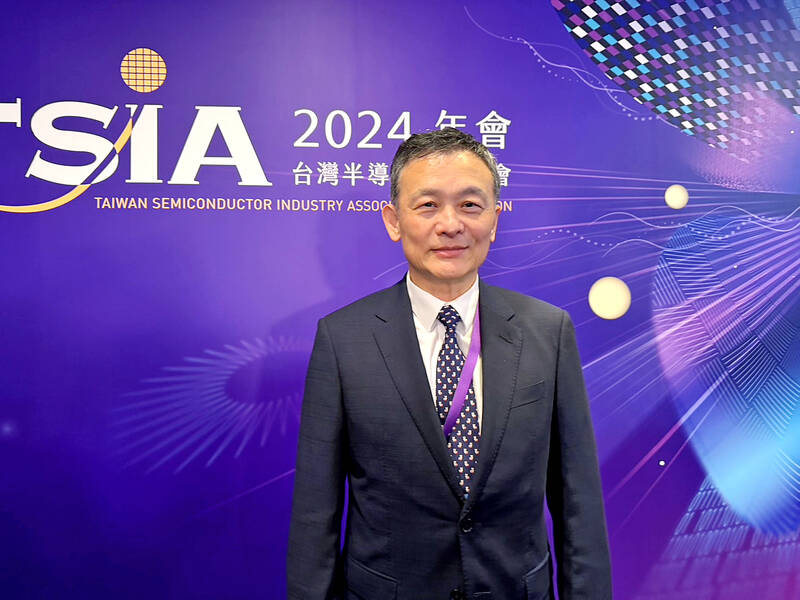The value of Taiwan’s semiconductor output is expected to grow 22 percent year-on-year to more than US$164 billion this year, a top executive from chipmaking giant Taiwan Semiconductor Manufacturing Co (TSMC, 台積電) said yesterday, driven by artificial intelligence (AI) technology and stronger economic growth.
Taiwan is a global power in semiconductors, which have become indispensable in an array of industries, from electronics to wind turbines, and even missiles.
TSMC controls more than half of the world’s output of chips and counts Apple Inc and Nvidia Corp among its clients.

Photo: Vanessa Cho, Taipei Times
Speaking at an industry event in Hsinchu, TSMC senior vice president Cliff Hou (侯永清) said Taiwan’s semiconductor output is expected to reach NT$5.3 trillion (US$164.2 billion) this year, up 22 percent on last year.
The increase is “driven by advancements in AI and gradual economic recovery”, said Hou, who is also the chairman of the Taiwan Semiconductor Industry Association.
“We should accelerate research and development to ensure our standing as an indispensable member of the global semiconductor supply chain,” Hou said, according to Bloomberg news agency.
Hou’s remarks came after Donald Trump’s victory in the US presidential election. Trump has accused Taiwan of stealing the US chip industry, raising fears the sector could be hit with tariffs.
Last month, Trump told podcast host Joe Rogan that Taiwan took away US semiconductor business and jobs. “These chip companies, they stole 95 percent of our business. It’s in Taiwan right now. They do a great job, but that’s only because we have stupid politicians,” Trump said as part of a lengthy interview where he also stated he protected Taiwan from China during his first stint as president.
The incoming Republican president went on to suggest that he could leverage tariffs, not subsidies, to convince companies like TSMC to build and expand chipmaking facilities on US soil, Bloomberg reported.
Hou said yesterday that Taiwan’s chip industry has not received any notification about new tariffs.
TSMC is at the forefront of a generative AI revolution, churning out the world’s most advanced microchips needed to power products made by Silicon Valley.
Surging demand for AI is having a knock-on effect across the entire semiconductor supply chain in Taiwan, Wayne Lin (林偉智), executive vice president at Witology Markettrend Research Institute (智璞產業趨勢研究所), told AFP.
“This expansion contributes to Taiwan’s projected output, along with the traditional peak season for mobile communications toward the year-end,” Lin said.

NEW IDENTITY: Known for its software, India has expanded into hardware, with its semiconductor industry growing from US$38bn in 2023 to US$45bn to US$50bn India on Saturday inaugurated its first semiconductor assembly and test facility, a milestone in the government’s push to reduce dependence on foreign chipmakers and stake a claim in a sector dominated by China. Indian Prime Minister Narendra Modi opened US firm Micron Technology Inc’s semiconductor assembly, test and packaging unit in his home state of Gujarat, hailing the “dawn of a new era” for India’s technology ambitions. “When young Indians look back in the future, they will see this decade as the turning point in our tech future,” Modi told the event, which was broadcast on his YouTube channel. The plant would convert

‘SEISMIC SHIFT’: The researcher forecast there would be about 1.1 billion mobile shipments this year, down from 1.26 billion the prior year and erasing years of gains The global smartphone market is expected to contract 12.9 percent this year due to the unprecedented memorychip shortage, marking “a crisis like no other,” researcher International Data Corp (IDC) said. The new forecast, a dramatic revision down from earlier estimates, gives the latest accounting of the ongoing memory crunch that is affecting every corner of the electronics industry. The demand for advanced memory to power artificial intelligence (AI) tasks has drained global supply until well into next year and jeopardizes the business model of many smartphone makers. IDC forecast about 1.1 billion mobile shipments this year, down from 1.26 billion the prior

People stand in a Pokemon store in Tokyo on Thursday. One of the world highest-grossing franchises is celebrated its 30th anniversary yesterday.

Zimbabwe’s ban on raw lithium exports is forcing Chinese miners to rethink their strategy, speeding up plans to process the metal locally instead of shipping it to China’s vast rechargeable battery industry. The country is Africa’s largest lithium producer and has one of the world’s largest reserves, according to the US Geological Survey (USGS). Zimbabwe already banned the export of lithium ore in 2022 and last year announced it would halt exports of lithium concentrates from January next year. However, on Wednesday it imposed the ban with immediate effect, leaving unclear what the lithium mining sector would do in the